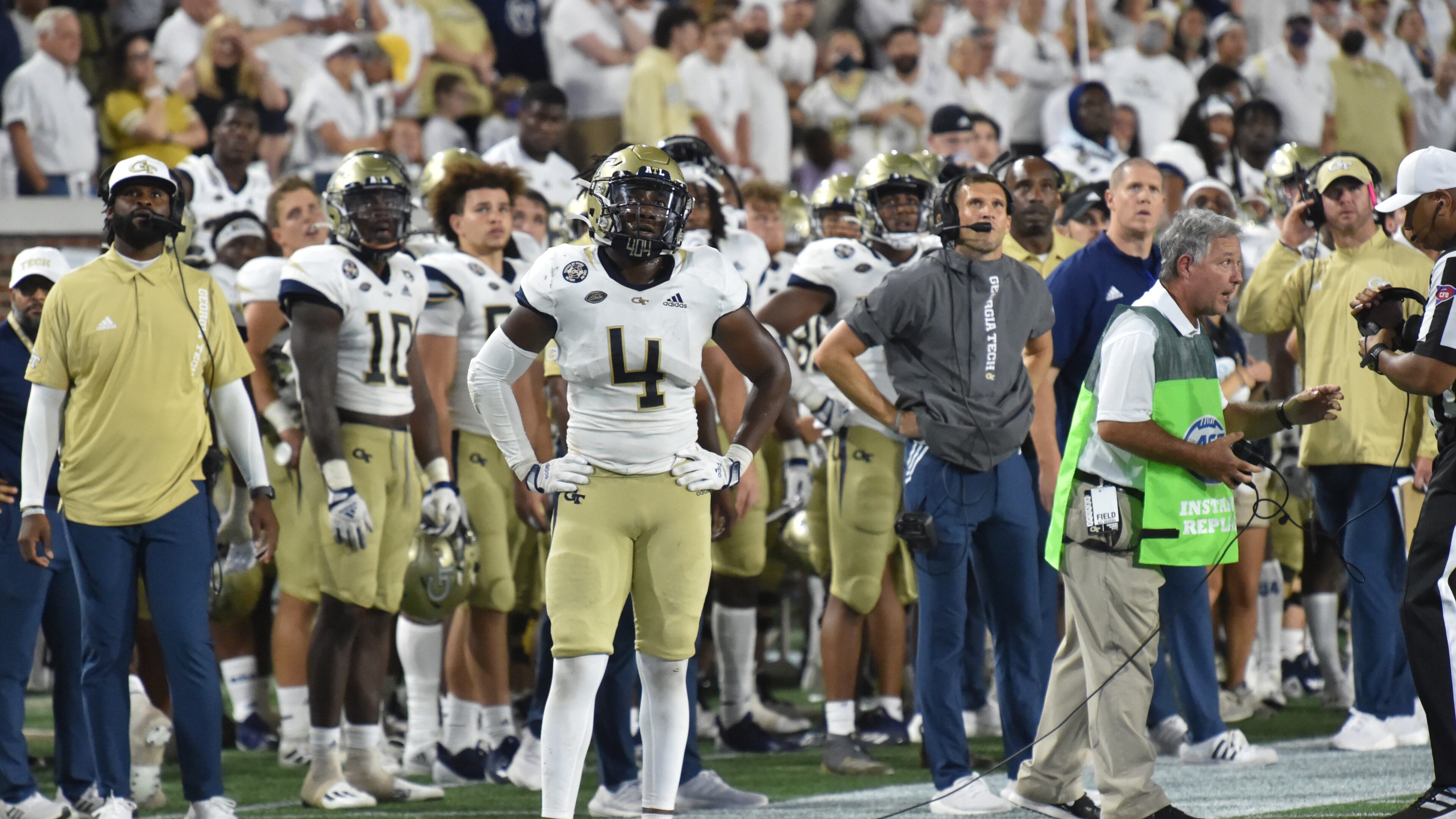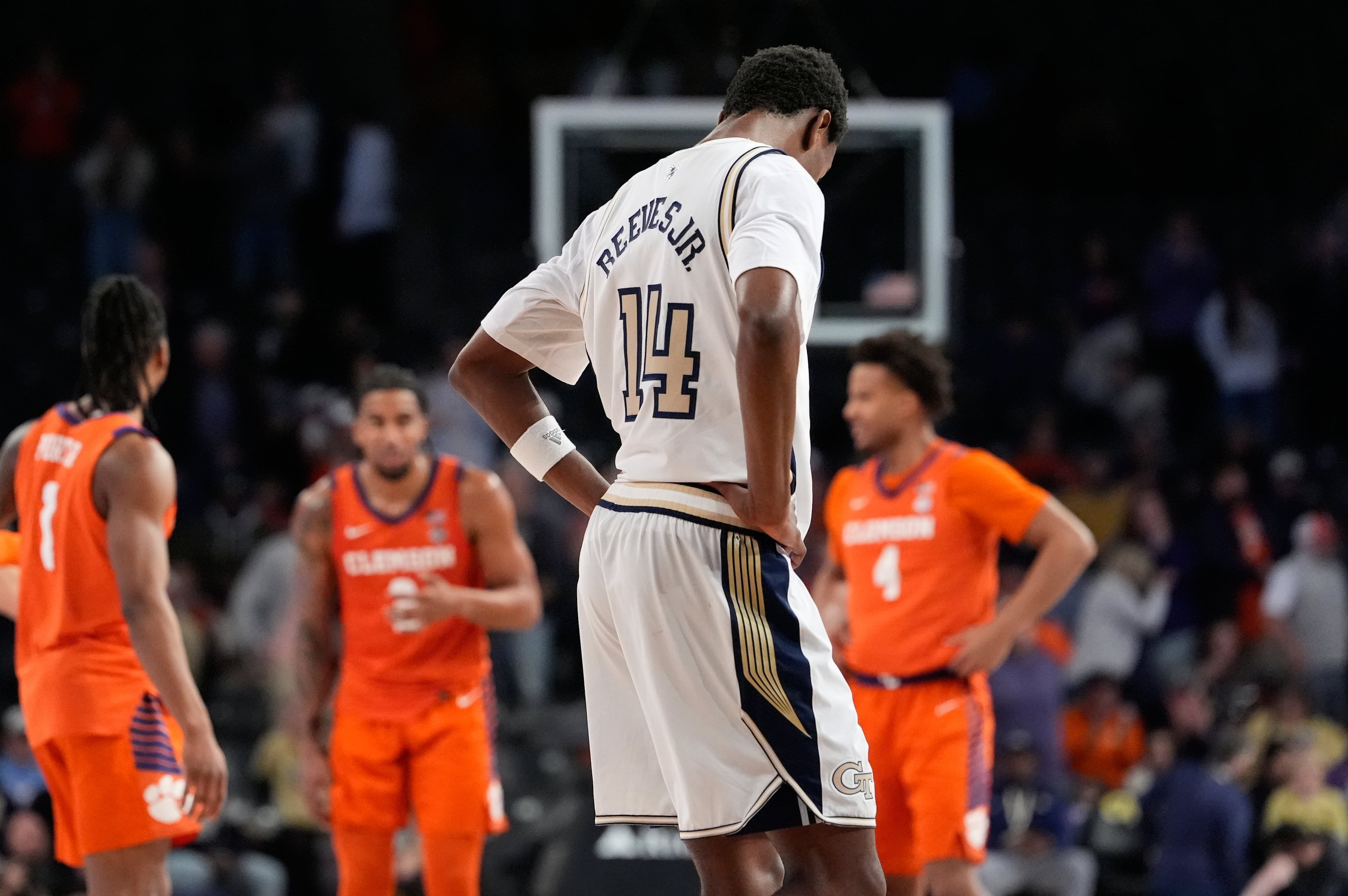Geoff Collins, Georgia Tech coordinators offer insights into in-game decisions

After Georgia Tech’s third-and-goal pass play from the Northern Illinois 3-yard line gained a single yard Saturday night at Bobby Dodd Stadium, Yellow Jackets coach Geoff Collins sent out kicker Brent Cimaglia and the field-goal unit for what likely would have been a 19-yard field-goal try against Northern Illinois.
Boos rained down from the stands from Tech fans preferring to see their team try to go for a touchdown on fourth-and-goal that would tie the score at 14-14. Collins called timeout, shelving the field-goal unit and sending out the offense for what would turn out to be an unsuccessful pass play that kept the score at 14-7 and gave the ball back to the Huskies at their 2-yard line.
Tuesday at his weekly news conference, Collins explained more of the decision making that led to the change in strategy and asserted that he was not acting in response to the crowd’s unfavorable reaction.
Collins said he reconsidered his decision to kick a field goal in part because of the difficulties that Tech has had making field goals in the past two seasons (6-for-16 combined) and then Cimaglia’s two misses earlier Saturday night, including one in which his plant foot slipped as he attempted a 51-yard try that fell short.
“There’s a lot of things that, as a head coach, you’ve got to weigh in real time,” Collins said. “Sometimes, it causes you pause, and I was feeling that pause, and so I reconsidered.”
He went on to say that he continues to have confidence in Cimaglia, who was 46-for-62 at Tennessee before coming to Tech before this season as a graduate transfer. Collins called him a “big-time kicker.”
Collins said also that he was not swayed by the reaction of fans to his sending out the field-goal unit.
“There are a lot of things I take into factor, and I have a healthy amount of respect for everybody that follows our program, but it’s the people in the building that are giving counsel and those kind of things that we rely on on game day,” Collins said.
A problem created by the timeout is that it left Tech with only one timeout when the Jackets tried to win the game in the final 38 seconds down 22-21 after the Huskies’ go-ahead touchdown and two-point conversion. Only able to stop the clock once, Tech could run only four plays (including one resulting in a penalty) before having to try a 60-yard field goal by Gavin Stewart that was blocked, ending the game.
Offensive coordinator Dave Patenaude said that sometimes Collins will tell him in advance that he wants the offense to go for it on fourth down if it reaches that point. Sometimes, he’ll ask if Patenaude has a fourth-down play he feels good about calling.
On Saturday, Patenaude said, “He came to me and said, ‘Hey, do you like something?’ I said, ‘Yeah.’ We went for it. I think we got it. They didn’t give it to us.”
On the play, quarterback Jordan Yates sprinted out to the right and his pass to wide receiver Kyric McGowan initially was ruled a touchdown, but was overturned on video replay when it was judged that his left foot was out of bounds as he caught the pass.
Patenaude acknowledged that, if a coach elects to kick a field goal, he might be derided as soft. And if he goes for the touchdown and comes up short, “then it’s like you know nothing about football. But you’re never going to make everybody happy,” he said. “You have to go with what your gut was.”
Collins and defensive coordinator Andrew Thacker also both provided further explanation of the communication issues that plagued the secondary on the Huskies’ game-winning touchdown drive in the final three minutes. Trailing 21-14, Northern Illinois drove 80 yards for the touchdown in nine plays, then took the lead on a two-point conversion.
At that point, not counting a kneel-down to end the first half, Tech had held the Huskies scoreless on the six previous possessions, limiting them to three plays or fewer five times. Collins suggested that the same focus and mindset that had helped the defense earn those stops was not present on the final drive.
“There is a level of composure that we needed to have on that drive,” Thacker said.
Thacker went on to say that, as much as players can train for critical situations, “it’s different in that moment. So, certainly a lesson for me, certainly a lesson for the guys.”
On the series, defensive backs were clearly having problems getting on the same page with each other before the snap. Communication between players before the snap has to be better “in those stressful environments, those stressful moments, just like when we played at a high level for a lot of those (previous) series,” Thacker said.
Tech cornerbacks and safeties have been meeting and training together more frequently since spring practice because they didn’t function effectively as a unit last season, Collins has said. However, the secondary is highly experienced and would seem the most prepared to be able to maintain composure and communicate effectively in stressful situations, particularly after an offseason of addressing the issue.
Thacker said he was not concerned about the problems repeating themselves.
“There’s hurt from that one, but there’s not a level of concern that it’s going to bleed into the future because we’re going to take that lesson and move from it,” he said.
Collins said that sometimes it was necessary to experience the heartbreaking consequences of a failure to execute for the lesson to sink in.
“Unfortunately, we had to experience it in real time, but those lessons are ones that (we) can build on to propel us to where we’re going,” he said.
More Stories
Keep Reading



